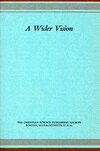

Are you sure?
This bookmark will be removed from all folders and any saved notes will be permanently removed.
"Where dwellest thou?"
It is recorded in the Bible that on one occasion at the beginning of Jesus' ministry he saw two men following him. He turned about and asked them what they were seeking. Thereupon they asked him, "Where dwellest thou?" He then invited them to come and see. The record goes on to say that they abode with him that day. One of the two was so greatly impressed that he found his brother, brought him to Jesus, and they both became his disciples. Nowhere in the narrative is there recorded anything about Jesus' abode, but as a result of that following, two most ardent seekers of good were recruited to the Master's cause.
It must have been something far beyond a mere visit to Jesus' habitation which led the disciples to seek the Christ. They must have discerned at once something of that divine nature which he so abundantly expressed, and which would reveal to them the divine way of salvation. In another instance, even a first encounter led another one to exclaim, "Thou art the Son of God"—a truly remarkable saying.
The question of a human dwelling place has ever engaged the thoughts of men. Unceasing efforts have been made to provide a proper one, to protect it, and to make it secure. To enjoy it in security and tranquillity has been the object of countless endeavors. Such efforts are commendable, and true stability will be made manifest in human experience as thought is lifted above the material into the spiritual, above the human into the divine.
Enjoy 1 free Sentinel article or audio program each month, including content from 1898 to today.
JSH Collections
This article is included in:
1938 - PAMPHLET
A wider vision
JSH-Online has hundreds of pamphlets, anthologies, and special editions for you to discover.

August 15, 1936 issue
View Issue-
"Where dwellest thou?"
CHARLES V. WINN
-
Supply as Spiritual Reflection
L. IVIMY GWALTER
-
Omnipresent Sanctuary
HERBERT H. NORSWORTHY
-
"Questions and answers"
MARY COWLES VILLERE
-
Christ's Government
HANS STRUSS
-
Why Choose the Hard Way?
E. OLIVE DAVIS
-
In the Christian Science textbook, "Science and Health with Key to the Scriptures"...
Lyman S. Abbott, Committee on Publication for the State of Michigan,
-
In a speech reported in the Express and Star a clergyman...
Mrs. Winifred M. Hartley, Committee on Publication for Staffordshire, England,
-
In the "Quiet Moments" radio broadcast from this station...
A statement by William A. Gilchrist, Committee on Publication for the Province of Saskatchewan,
-
Kindly grant me space to reply to a letter signed by...
George H. Kitendaugh, Committee on Publication for Jamaica, British West Indies,
-
Christian Science is the reinstatement of the Christianity...
Extracts from an informal talk by Albert M. Cheney, Sunday, May 31, 1936, at the California Pacific International Exposition,
-
From a letter dated 1896
Mary Baker Eddy
-
Spiritual Attainment
DUNCAN Sinclair
-
Incorporeality
Violet Ker Seymer
-
The Lectures
with contributions from Myrtle Kem, Marion Collie Alves, Pierce M. Brown, Elisabeth Kurtz, Oscar Murray Hudson, James T. Jones, Mary Margaret Currie, Archie M. Carpenter
-
I wish by giving this testimony to express my gratitude...
Joseph Dietrich
-
Christian Science was presented to me by a beloved employer...
Thelma E. White
-
With deep humility I wish to express my gratitude for the...
Margaret A. Hiatt
-
I should like to express my gratitude for a healing which...
Thelma Chance Dover with contributions from W. B. Dover
-
I feel that the time has come when I should give thanks...
Ellen L. Stone
-
The benefits that we as a family have derived from...
Victoria C. Falkenburg
-
What wonderful inspiration and healing one finds in a...
William Edward Hayes
-
I wish to express my deep gratitude for all the blessings...
Florence M. Phillips
-
Christian Science has been such a blessing to my family...
Theodore W. Muller with contributions from Helene F. Muller
-
The Anointed
EDNA J. PHILLIPS
-
Signs of the Times
with contributions from Albert Buckner Coe, I.P.F., F. J. H. Coffin, W.D.L., F. J. Gilbert


